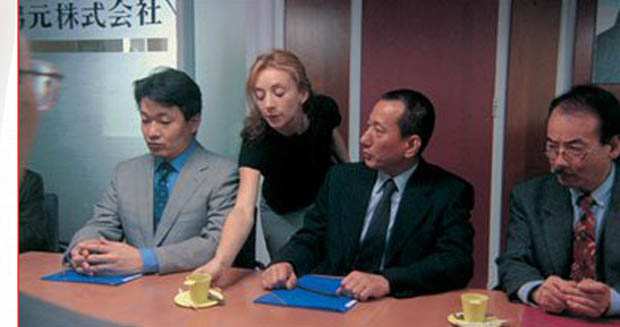Coluna Claquete – June 14, 2016 – Movie of the Week: “Fear and Trembling”
Newton Ramalho
colunaclaquete@gmail.com – www.colunaclaquete.blogspot.com– @colunaclaquete
Movie of the Week: “Fear and Trembling”
Different cultures are always attractive, although it is often difficult to understand them, especially when you have to live in another country. This becomes even more complex when the country in question is Japan, which throughout its history had long periods isolated from the rest of the world. This isolation led to traditions and values that are very different from other cultures, and always cause astonishment to the “gaijin”, the foreigners. A film that explores this topic in a very interesting way is “Fear and Trembling” (“Stupeur et Tremblements”, 2003), directed by Alain Corneau.
The film is based on the book of the same name written by the Belgian author Amélie Nothomb, which, in theory, would be her memories of the time she lived and worked in Japan. Diplomat’s daughter, Amélie lived in Japan as a child and fell in love with Japanese culture becoming fluent in the language, although not in writing.
The character Amélie (Sylvie Testud), however, is an interpreter, fluent in French, English and Japanese.Contracted by a large Japanese corporation, she wants to realize her dream of living and working in Japan.
But business world in Japan is quite different from the rest of the world. The company’s president, Mr. Haneda (Sokyu Fujita) is inaccessible, the vice-president, Mr Omochi (Bison Katayama) is wrathful and obese, the chief accountant, Mr. Saito (Tarot Suwa) is also aggressive and demanding, and the last superior on Amélie scale is the beautiful and efficient Fubuki (Kaori Tsuji), one of the few women to exercise managerial role in the company.
Thus, Amélie will find that speak the language or know the customs is not a garantee to move freely in the Japanese universe. In fact, her first major gaffe is when she serves tea to visitors from another company. When she acts and speaks as a Japanese, it creates an uncomfortable situation for the company.
Her new stumbling happens when she prepares a report on a Belgian company, at the request of the sympathetic Mr. Tenshi (Yasunari Kondo). The work causes a great commotion, as this is considered a break of hierarchy, as the responsible for the area was on a business trip. But for Amélie, the biggest disappointment was to know that she was denounced by Fubuki.
These blunders result in worsening assignments for Amélie, which hits rock bottom when given the task of taking care of the office bathrooms.Still, she does not give up the work, because for a Japanese, resign is an unacceptable disgrace.
The film was very faithful to the book, and brings to the reader a rare and unglamorous glimpse of Japanese culture, observed by someone who already knows much of the country, and can make a comparative analysis.
The story is set in 1990, a time when Japan’s economy was considered extremely advanced, with lessons for everyone about quality, production efficiency, and other advances – while relations at work was still conducted as in the samurais time. The loyalty and blind obedience were considered more important than innovation, promotions demanded a long company time, and public humiliations were the most common punishment. Wonder if today it remains. Maybe not, but some things never change.
But beyond the cultural shocks, the film brings the optimal performance of the two leading actresses, though the highlight is the French Sylvie Testud. The actress, who does not speak Japanese, learned by heart her eleven hundred lines thanks to a phonetic method, and her performance earned César and Lumière awards for Best Actress, and the French Cinema Gold Star.Her innocent way gives a lot of credibility to the character, and ensures the mood required for this history of humiliations.
But perhaps the most important point of the film is to draw attention to the suffering Japanese woman who must give up their lives to devote to work, and never got the recognition because of society.
I recommend everyone both the film and the book, which already has a Portuguese edition. The title “Fear and Trembling” refers to the way a Japanese should appear before the Emperor, with fear and trembling, as he is considered a divine figure.
Original title: “Stupeur et Tremblements”










